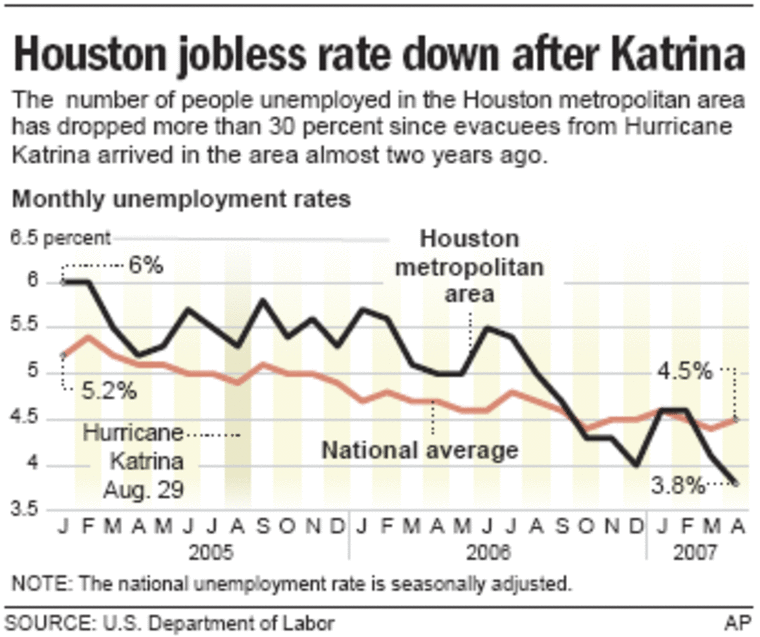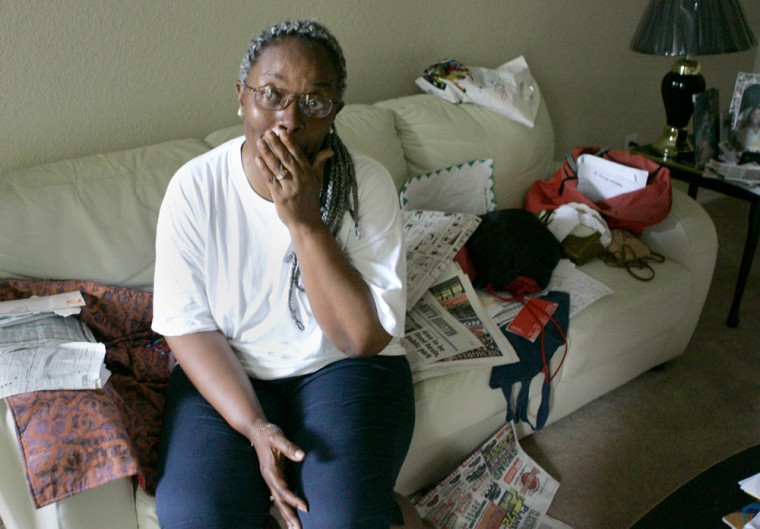Nineteen months after Hurricane Katrina sent evacuees from New Orleans streaming into Houston, more than 5,000 heads of households among them are still unemployed despite the city's booming economy, officials say.
The number of jobless is contributing to the sense among some Houston-area residents that the storm's victims are a drain on the city and have worn out their welcome.
After the storm, a quarter-million evacuees were brought to Houston, welcomed by Mayor Bill White, who threw open the Astrodome. Even before the storm, many were desperately poor, unemployed and on welfare or food stamps.
Many had been holding out hope that they would be home in New Orleans by now, but the city's rebuilding has been painfully slow, and about 100,000 are still here. They have settled in more or less permanently, some still on food stamps.
About 12,000 families are still getting federal aid for housing, the city said. Of that group, about 5,500 heads of households are unemployed, not counting those who are elderly and disabled, city officials said.
Houston's economy is hot because of the booming oil and gas industry. City officials say there are 2 million job openings, 59,000 of which require only a high school education. Houston's unemployment rate is 3.8 percent, versus 4.5 percent nationally.
The mayor — who was recently given the John F. Kennedy Profile in Courage Award, bestowed on politicians who risk their popularity to do what they regard as the right thing — defended the evacuees, saying: "I don't think most people want to live in trailer cities or shelters. They want to get on with their lives."
But Republican Rep. John Culberson said the evacuees should have benefits cut off if they don't get a job.
"We're a charitable nation and Houston in particular has a big heart, and we have already gone way above and beyond the call of duty to help our neighbors," Culberson said. "It's time for everyone who can work to get to work."
Sixty-five percent of Houstonians surveyed earlier this year by Rice University said the influx of evacuees has been a "bad thing" for their city. And some blame the new residents for a surge in violent crime. The number of homicides jumped from 275 in 2004 to 376 in 2006.
Harris County Commissioner Steve Radack said the government should be doing more to help evacuees find jobs, transportation and child care.
"For the taxpayers that are out there working, it's an insult that their federal taxes are going toward paying people who aren't working," he said. "It's outrageous."
The government already is offering considerable help. FEMA-paid housing has been extended to 2009 and federal officials will move an evacuee closer to a job. Thirty hours of work a week earns an evacuee free child care.
The city Community Settlement Task Force Network has spent $1.9 million since October offering resume help, free interview-appropriate clothes, job fairs, financial workshops, free food for children, computer classes, even hurricane-preparedness workshops. The money comes from $550 million in federal social-services grants that Congress authorized for all Katrina evacuees.
Some evacuees say they did not know such help was available. And even with help, evacuees say there are still many obstacles to landing a job.
"Transportation is a huge problem. Child care is a huge problem. Thinking that they were not sure they were staying in Houston was a huge problem," said Cindy Gabriel, a spokeswoman for the task force.
Houston is sprawling metropolitan area, with a web of highways; New Orleans is more compact, and many residents there relied on public transportation — something not always available in their new city. Also, some single mothers are separated from members of their extended family and can no longer rely on them for child care.
Odessa Jarreau, 61, said that just being an evacuee is making it harder to find a job.
"Once we put in the applications and they see the Louisiana connection, they don't even consider it. We don't even get calls back," she said. "It drains you, you know? You feel like you're not worth anything."
Before the storm, Jarreau was a parking supervisor at the Superdome. But comparable jobs in Houston require being outside, she said, which Jarreau cannot do because of her high blood pressure.
Jarreau said that after more than a year, her daily routine of making calls to employment agencies and employers, attending job fairs and walking around her neighborhood in search for wanted signs has yielded nothing.
A potential job with AARP did not pan out because it would have required a bus trip of several hours to get to work. Calls to a school district to offer her services as a bus aide or cafeteria worker were never returned, she said. She failed the test to get a job cleaning airplanes.

